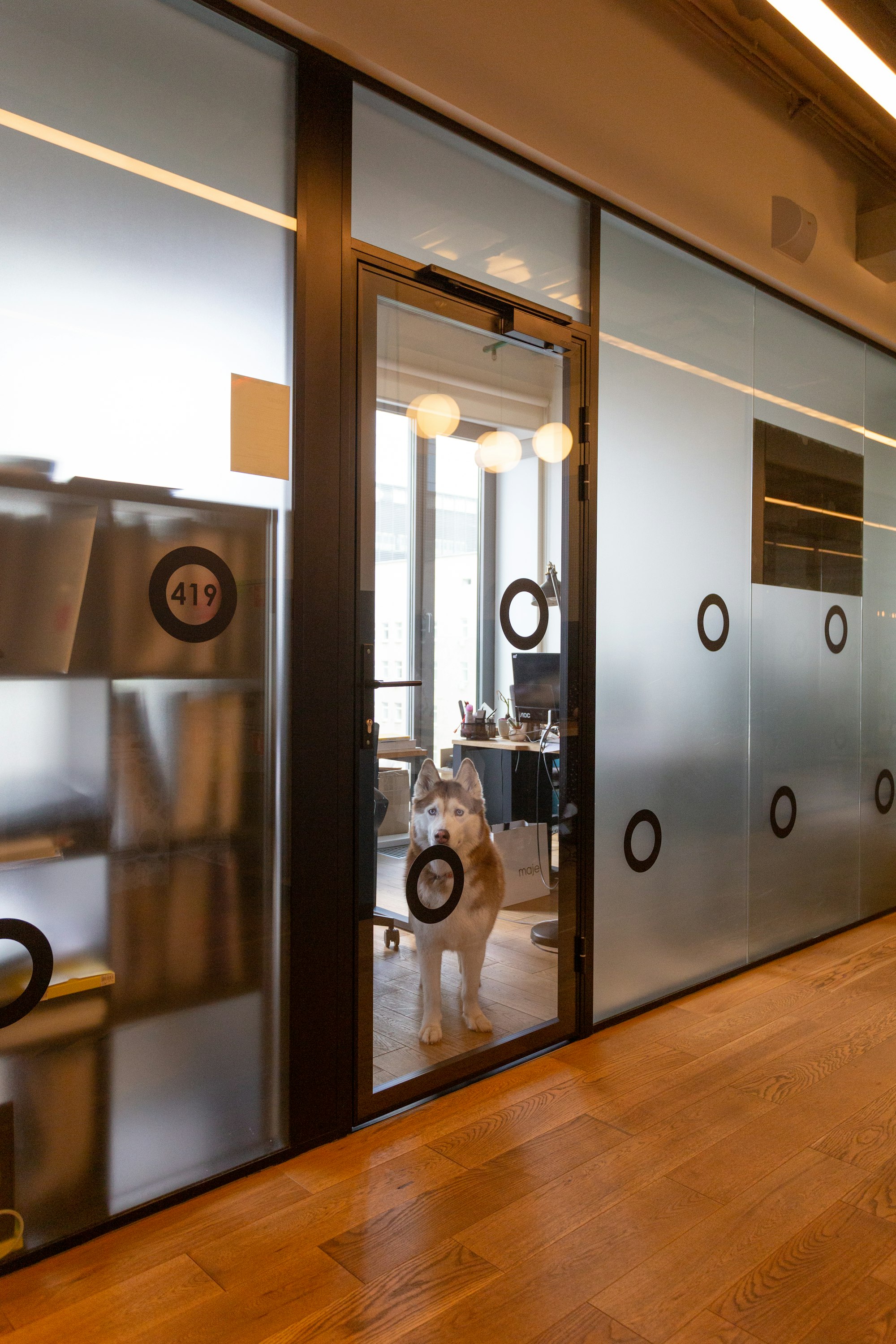Having dogs in the office is becoming increasingly popular as companies recognize the numerous benefits they bring to the workplace. From reducing stress to improving productivity and fostering better communication, office dogs can have a positive impact on both employees and the overall work environment. Research studies have shown that having dogs present in the office can lead to increased employee satisfaction, reduced stress levels, and enhanced job performance.
Considering the factors for choosing office dogs is crucial to ensure a harmonious and safe environment. Factors such as temperament, size, breed, training, and behavior should be taken into account. allergies and sensitivities of employees should be considered when selecting office dogs.
Certain breeds are known to be well-suited for office settings due to their temperament and adaptability. Some top breeds for office dogs include Labrador Retrievers, French Bulldogs, Beagles, Cavalier King Charles Spaniels, and Golden Retrievers.
Introducing office dogs requires careful planning and implementation. Establishing guidelines and creating a dog-friendly environment are essential steps. Setting up a doggy schedule and providing adequate exercise and mental stimulation contribute to a positive and conducive atmosphere.
Many successful companies have embraced the concept of office dogs with inspiring results. Companies such as Google, Amazon, Etsy, and Ben & Jerry's have incorporated office dogs into their culture, resulting in happier employees and a more relaxed work environment.
Key takeaways:
- Having dogs in the office reduces stress: Studies have shown that interacting with dogs can help lower stress levels and create a more relaxed work environment.
- Office dogs improve productivity: Dogs in the office can boost employees' mood and morale, leading to increased productivity and job satisfaction.
- Consideration is important in choosing office dogs: Factors like temperament, size, breed, training, and allergies should be taken into account when selecting office dogs to ensure a harmonious and safe environment for all employees.

Benefits of Having Dogs in the Office
Having dogs in the office is more than just a trendy perk - it offers tangible benefits that can boost workplace morale and productivity. From stress reduction to improved communication, these furry companions bring a range of advantages. Studies have shown that office dogs contribute to lower stress levels among employees, leading to a more relaxed and positive work environment. Having dogs in the office has been linked to increased productivity and enhanced communication among team members. So, let's dive into the various ways in which these four-legged colleagues make our work lives better.
Stress Reduction
Introducing office dogs can have significant benefits, including stress reduction for employees. Office dogs can help reduce stress by providing companionship and emotional support, encouraging breaks and physical activity, creating a relaxed and positive atmosphere, offering a distraction from work-related stressors, and promoting social interactions among employees. Having office dogs ultimately contributes to a happier and more productive work environment by alleviating stress and boosting employee well-being.
Increased Productivity
Having dogs in the office can lead to increased productivity. Interacting with dogs has been shown to reduce stress levels, which in turn improves focus and concentration. Additionally, having dogs in the office creates a positive and enjoyable work environment, boosting morale and increasing motivation. Dogs can also act as social catalysts, fostering communication and collaboration among coworkers, thus improving work relationships. Taking regular breaks to walk or play with office dogs promotes physical activity, helping employees stay active and energized throughout the day. Moreover, the presence of dogs in the office can reduce absenteeism as employees are less likely to take sick leave or personal days. All these factors combined contribute to a more productive and efficient work environment when dogs are present in the office.
Improved Communication
Improved communication is one of the many benefits of having dogs in the office. Dogs have a way of breaking down barriers and creating a sense of camaraderie among colleagues. They promote interaction and can help facilitate communication between team members. When people see and interact with dogs, their communication skills tend to be enhanced, making them more open, friendly, and approachable. This can ultimately lead to increased collaboration and foster better teamwork. Having dogs in the office can also create a shared topic of conversation, improving communication among employees and helping them bond over their shared love for pets. *Pro-tip:* To further enhance communication, it is recommended to encourage dog-friendly spaces where employees can gather and engage in informal conversations, thus fostering even more improved communication.

Considerations for Choosing Office Dogs
Looking to add some wagging tails and furry friends to your office space? In this section, we'll explore key considerations for choosing the perfect office dogs. From understanding their temperament to ensuring their size and breed are a good fit, we'll cover it all. We'll dive into training and behavior tips for a harmonious work environment, as well as how to manage allergies and sensitivities. So, get ready to create a pet-friendly office that's sure to boost morale and productivity!
Temperament
The temperament of office dogs is of utmost importance when considering their suitability for the workplace. Take into account a few key points when selecting office dogs:
- Sociability: Look for breeds that have a reputation for being friendly and sociable, like Labrador Retrievers and Golden Retrievers.
- Adaptability: French Bulldogs, for example, are known for their ability to easily adapt to different environments and handle various situations, making them excellent office companions.
- Trainability: Opt for breeds that are intelligent and trainable, such as Beagles and Cavalier King Charles Spaniels. These dogs are quick learners and are capable of following commands easily.
- Compatibility: It is essential to assess the compatibility of the dog with other dogs, animals, and people to ensure a harmonious work environment.
- Tolerance: Office dogs should be comfortable with noise, distractions, and a bustling work environment.
Size and Breed
When selecting office dogs, it is essential to take into consideration size and breed to ensure they are a suitable match for the work environment. Here are some factors to think about:
- Temperament: Seek out breeds that are recognized for being friendly and adaptable, such as Labrador Retrievers or Cavalier King Charles Spaniels.
- Size: Evaluate the available space in the office and opt for a breed that can comfortably fit, like French Bulldogs or Beagles.
- Training and behavior: Choose breeds that are known for being trainable and well-behaved, making it easier to integrate them into the office setting.
- Allergies and sensitivities: Keep in mind any potential allergies or sensitivities that employees may have when selecting a breed.
One marketing agency in Chicago successfully introduced office dogs into their workplace. They decided to include a mixture of small and medium-sized breeds with friendly temperaments, allowing employees to enjoy the dogs' presence without causing significant disruptions in the office. The dogs have become cherished companions, helping to alleviate stress and foster a positive work environment.
Training and Behavior
When selecting office dogs, training and behavior are vital considerations for creating a positive work environment. Here are some factors to take into account:
- Temperament: It is important to look for dogs with calm and friendly temperaments that can easily adapt to office surroundings.
- Size and Breed: The size of the office space should be considered when choosing a breed that suits the environment. Small to medium-sized breeds such as French Bulldogs or Cavaliers can be ideal.
- Priority should be given to dogs that have undergone proper obedience training and demonstrate good behavior around people and other animals.
- Allergies and Sensitivities: Employees' allergies and sensitivities to dogs should be taken into consideration. Hypoallergenic breeds may be a suitable option.
By carefully considering these factors, you can ensure that the office dogs contribute positively to the atmosphere of the workplace.
Allergies and Sensitivities
When selecting office dogs, it's important to consider allergies and sensitivities among employees. Some individuals may have allergies to certain breeds or be sensitive to pet dander. To create a harmonious and inclusive work environment, here are some suggestions: - Prioritize hypoallergenic breeds such as Poodles or Labradoodles, which produce less dander. - Implement strict grooming and cleaning protocols to minimize allergens. - Offer designated pet-free areas for employees with severe allergies. - Consider alternative options like therapy dogs or virtual pet interactions for individuals with extreme sensitivities. Remember, accommodating allergies and sensitivities will foster a more inclusive and comfortable workplace environment.

Top Breeds for Office Dogs
Looking for the perfect canine companion to brighten up your office space? Look no further! In this section, we'll explore the top breeds that make excellent office dogs. From the loyal Labrador Retriever to the charming French Bulldog, the lively Beagle to the elegant Cavalier King Charles Spaniel, and the friendly Golden Retriever, we'll discover the unique qualities and benefits each breed brings to the workplace. Get ready to meet your new furry coworker!
Labrador Retriever
The Labrador Retriever is a popular choice for office dogs due to its friendly and sociable nature. Here are a few reasons why they make great office companions:
- Temperament: Labradors are known for their friendly and outgoing personality, making them easy to get along with in the office environment.
- Size and Breed: Labradors are medium to large-sized dogs, making them suitable for most office spaces. This breed is also known for its intelligence and trainability.
- Training and Behavior: Labradors are highly trainable and can be taught to follow office rules and commands easily. They have a calm and well-mannered demeanor.
- Allergies and Sensitivities: Labradors have a relatively low shedding coat, which reduces the risk of triggering allergies or sensitivities in the office.
Labrador Retrievers bring joy and companionship to the office, promoting a positive work environment and reducing stress for employees. Their friendly nature helps improve communication and create a welcoming atmosphere.

French Bulldog
French Bulldogs make excellent office dogs due to their friendly and adaptable nature. Here is a list of reasons why French Bulldogs are a great choice for the office:
- Temperament: French Bulldogs are known for their friendly and sociable nature, making them great companions for office environments.
- Size and Breed: French Bulldogs are small in size, making them well-suited for office spaces with limited room.
- Training and Behavior: French Bulldogs are intelligent and easy to train, which is beneficial for maintaining a well-behaved and obedient dog in the office.
- Allergies and Sensitivities: French Bulldogs have short hair and minimal shedding, making them a good option for individuals with allergies or sensitivities.
Considering these factors, French Bulldogs can bring joy, companionship, and a positive atmosphere to any office setting.
Beagle
The Beagle is a popular choice for office dogs due to its friendly and sociable nature. They are small to medium-sized dogs known for their loyalty and intelligence. Beagles are excellent at providing emotional support and can help boost morale in the office. They are generally well-behaved and adaptable, making them a great fit for different work environments. With proper training and attention, Beagles can be calm and well-mannered in the office. Their playful nature also provides opportunities for stress relief and improved communication among colleagues. Consider incorporating Beagles into the office as they bring joy and positive energy to the workplace.
| Characteristics | Benefits |
|---|---|
| Friendly and sociable | Promotes a positive work environment |
| Loyal and intelligent | Provides emotional support |
| Well-behaved and adaptable | Suits various work environments |
| Playful nature | Relieves stress and improves communication |
Cavalier King Charles Spaniel
The Cavalier King Charles Spaniel is a popular breed for office dogs due to their friendly and adaptable nature. Here are some reasons why they make great companions in the workplace:
- Size: They are small in size, making them suitable for smaller office spaces.
- Temperament: They have a gentle and affectionate temperament, making them well-suited for interacting with coworkers and clients.
- Trainability: Cavalier King Charles Spaniels are intelligent and easy to train, making them well-behaved and obedient in the office environment.
- Low Allergenic: They have low-shedding coats, making them a good choice for individuals with allergies.
- Therapeutic Benefits: Their calm and comforting presence can help reduce stress and improve overall workplace morale.
Consider these factors when choosing a Cavalier King Charles Spaniel as your office companion. Their friendly nature and adaptability make them an excellent choice for a stress-free and enjoyable work environment.
Golden Retriever
Golden Retrievers are an excellent choice for office dogs due to their friendly and social nature. Here are some reasons why they make great companions in the workplace:
- Temperament: Golden Retrievers are known for their calm and gentle temperament, making them well-suited for interacting with employees and visitors.
- Intelligence: They are highly intelligent and trainable, making them easy to teach office etiquette and commands.
- Reliability: Golden Retrievers are reliable and trustworthy, helping to create a positive and safe work environment.
- Emotional support: They provide emotional support and reduce stress levels, leading to increased productivity and improved well-being for employees.
- Good with other pets: Golden Retrievers typically get along well with other pets, promoting a harmonious and inclusive office environment.
Tips for Introducing Office Dogs
Introducing office dogs can be a game-changer for boosting morale and productivity. In this section, we'll explore some invaluable tips that will make the process of welcoming office dogs a breeze. From establishing guidelines to creating a dog-friendly environment, setting up a doggy schedule, and ensuring adequate exercise and mental stimulation, we've got you covered. So, get ready to learn the secrets of integrating furry friends into the workplace!
Establish Guidelines
Establishing guidelines is essential when introducing office dogs to ensure a safe and harmonious environment for both employees and the dogs themselves. Here are some steps to consider for establishing guidelines:
- Create a clear policy that establishes the expectations, rules, and responsibilities for having dogs in the office.
- Establish guidelines for dog behavior, including requiring dogs to be well-behaved, non-aggressive, and properly trained.
- Set boundaries for areas where dogs are allowed and areas that are off-limits.
- Implement a system for registering and verifying the vaccination and health records of office dogs.
- Establish guidelines for dog-related issues, such as noise, cleanliness, and hygiene.
- Designate a responsible person or committee to oversee and enforce the guidelines.
- Regularly communicate and educate employees about the guidelines to ensure compliance and address any concerns or issues that may arise.
Create a Dog-Friendly Environment
- Creating a dog-friendly environment in the office involves following these steps:
- Establishing guidelines: It is important to set clear rules and expectations for behavior, making it clear that aggressive behavior or excessive barking is not allowed.
- Designating a dog-friendly area: Set up a specific space in the office where dogs can relax and play. This area should be equipped with comfortable beds, toys, and water bowls.
- Providing necessary supplies: Make sure to stock up on essentials like poop bags, cleaning supplies, and pet-friendly cleaning products.
- Scheduling regular breaks and exercise: Implement designated break times for dogs to go outside for walks or play. This ensures that they get enough physical activity.
- Promoting a calm and quiet environment: Encourage employees to speak softly and avoid sudden loud noises that may startle the dogs.
By following these steps, you can successfully create a dog-friendly environment in the office, which will promote a positive and enjoyable experience for both dogs and employees.
Set Up a Doggy Schedule
- Setting up a doggy schedule is crucial for creating a harmonious environment for both employees and dogs. Follow these steps to effectively establish a doggy schedule:
- Designated work area: Begin by setting up a designated space for dogs to work and rest, furnished with comfortable beds and toys.
- Feeding and bathroom breaks: Establish specific times for feeding and bathroom breaks to maintain a routine.
- Exercise time: Incorporate regular exercise breaks to ensure dogs stay physically active and prevent restlessness.
- Quiet time: Allocate time for quiet periods to minimize distractions and promote relaxation.
- Training sessions: Schedule regular training sessions to reinforce good behavior and obedience.
Pro-tip: It's important to be flexible with the schedule and adapt it as needed to accommodate the individual needs and preferences of both dogs and employees.
Provide Adequate Exercise and Mental Stimulation
Provide Adequate Exercise and Mental Stimulation
Adequate exercise and mental stimulation are essential for office dogs to thrive and remain happy in the workplace. Here are some strategies to ensure that they receive what they need:
- Regular walks: Schedule daily walks during breaks or lunchtime to provide them with physical exercise and mental stimulation.
- Playtime: Encourage interactive play sessions with toys or participate in activities like fetch to keep them mentally engaged.
- Puzzle toys: Utilize puzzle toys or treat-dispensing toys to challenge their problem-solving skills and keep them entertained.
- Training sessions: Incorporate short training sessions throughout the day to keep their minds active and establish a strong bond with them.
By implementing these steps, you can help guarantee that office dogs receive the adequate exercise and mental stimulation they require to be happy and content in the workplace.

Success Stories: Companies with Office Dogs
Success Stories: Companies with Office Dogs
Having office dogs can bring numerous benefits to companies, including increased employee morale and productivity, improved work-life balance, and enhanced company culture. Here are some success stories of companies that have embraced the idea of having office dogs:
- Google: Known for its employee-friendly policies, Google allows dogs in their offices, which promotes a relaxed and positive work environment.
- Amazon: This e-commerce giant encourages a pet-friendly workplace, providing designated areas for dogs to play and interact, making the office more enjoyable for their employees.
- Zynga: This social media gaming company believes that having office dogs helps reduce stress, increase creativity, and create a greater sense of camaraderie among employees.
- Ben & Jerry's: This popular ice cream company is known for allowing dogs in their office, creating a fun and welcoming atmosphere for both employees and visitors.
- PetSmart: As a company focused on pets, it's no surprise that PetSmart allows dogs in their offices. This not only aligns with their brand values but also creates a pet-friendly work environment.
Frequently Asked Questions
What are the best dog breeds to bring to the office?
According to a dog behaviorist from Barking Heads, some of the best dog breeds for the office include Cocker Spaniels, Great Danes, German Shepherds, and Poodles. These breeds are known for their friendly and sociable nature, quiet temperament, loyalty, and ease of training.
Are small dogs better suited for the office?
Yes, small dogs that weigh less than 20 pounds are ideal for the office environment. They can easily fit under desks and occupy a small space without causing any disruptions. Some small dog breeds that do not shed much and can be great office companions include Bichon Frise, Maltese, Shih Tzu, and Yorkshire Terrier.
Why are non-shedding dogs preferred for the office?
Dogs that do not shed are preferred for the office to avoid leaving dog hair on furniture and clothing, which can be inconvenient for employees. It helps to maintain a clean and professional environment without having to worry about allergies or constant cleaning.
How do dogs improve the office atmosphere?
Research from the UK Kennel Club shows that dogs can alleviate stress, improve morale, and increase job satisfaction in the workplace. Dogs provide companionship, create a friendly atmosphere, and can be a built-in stress reducer during busy workdays. They also encourage social interaction among employees.
Can I bring a dog to the office if I am working from home?
If your workplace allows pets and you are working from home, it may be easier to bring a dog to the office. With the increase in home working due to the Covid crisis, more people have the opportunity to care for their pets and bring them to a pet-friendly workplace.
Where can I find more information about suitable office dog breeds?
A good starting point for information on dog breeds and office suitability is the /r/dogs subreddit and the American Kennel Club. These sources provide insightful research, discussions among dog owners, and recommendations for office-friendly dog breeds. However, it is important to verify and expand upon the information from reputable sources and consult a trained professional for personalized advice.